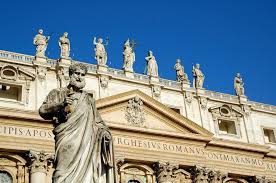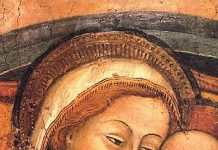There are three ‘dimensions’ to the Church in her pilgrimage through time: The Church suffering, in purgatory; the Church triumphant, in heaven; and the Church militant, here on Earth. These terms are muted in the current Catechism, but the idea is implicit. The Church is not at war in an earthly sense – as Christ’s reply to Pilate signifies – but in a spiritual one: Against all the principalities and powers, Satan and his minions, angelic and human, who, in their envy and malice, seek to block as many souls as possible from entering paradise.
More on that anon, but for now, to the point that, as a military organization, it is requisite the Church maintain her structure and discipline, especially when things seem to be falling apart, when they are needed most.
A significant component of that ‘structure and discipline’ is the hierarchy and, as much as possible and practical, our respect and obedience.
A significant part of the ongoing problem in the Church is the lack of obedience, for any ‘hierarchy’ only works when everyone buys in. A lawless Church militant is an oxymoron, and it is disconcerting when the officers themselves so often don’t seem obey what their own institution – in this case, a divinely-guided one – tells them to do. We are left flummoxed, and are like foot-soldiers who have seen the master-plan of their general, but find their officers flouting it: Do they obey the bishops, or the Church?
Here are just a few examples of laws, decrees and disciplines, that have been formally promulgated, and are binding upon the Church. They are sort of random, and of varying degrees of gravity, some moral, some disciplinary. But the point is how well they are preached, observed and obeyed.
- The Eucharist is the Body, Blood, Soul and Divinity of Our Lord and Saviour Jesus Christ. Only those in full communion with the Church may receive, and those persisting in manifest grave sin are to be denied. This has been clarified to include politicians who formally support legalized abortion. What we do to Christ’s little ones…
- Same-sex attraction is inherently disordered, and acting upon such is objectively sinful. Persons with such attraction must be treated with compassion and respect, but the truth about the meaning of sexuality must never be denied.
- The apparent compromise of ‘same-sex unions’ are at the very least an occasion of sin, and a public scandal.
- Contraception is intrinsically evil, and never permitted. Large families are a blessing from God.
- Pornography and attendant masturbation are also grave evils, corrupting the persons involved.
- One must enter marriage in a state of grace, if not virginal, at least living in chastity and continence.
- Marriage forms an indissoluble bond. Couples should be prepared to make this commitment, and annulments should be rare, and rarely given.
- Outside of the danger of death, children should be baptized only if there is practical certainty they will be raised Catholic.
- Catholics schools should actually teach the Catholic Faith, in its entirety, without compromise. Teachers who have rejected the Faith should not be permitted to teach.
- Latin is still the universal language of the Roman rite, and its liturgy should be prayed and celebrated so, with some allowance for the vernacular (and not the other way around).
- Gregorian chant should be the primary ‘music’ at Mass, and the pipe organ is to be the primary instrument at Mass. Any other music must be ‘apt for sacred use’.
- All Latin-rite priests are to be proficient in Latin. Very few of them are – and it’s often not their fault, with the deficient formation they receive. See Catholic schools, above.
- Nowhere is there is a mandate to say Mass ‘facing the people’. And, while we’re at it, the traditional rite can never be abrogated.
- All priests – indeed, all students – are to be taught in their course of studies with ‘Saint Thomas Aquinas as teacher’. That means, primarily, the Summa Theologica.
- Catholics should have a knowledge of their Faith and its doctrine on the same level as their secular knowledge.
- The sacrament of Confirmation is to be given before Holy Communion, both at the ‘age of discretion’ (i.e., at the dawn of reason, when the child can discern between good and evil, right and wrong) and First Confession before either of them.
- Communion is to be given on the tongue, with reception on the hand an ‘indult’, which was permitted only for extraordinary reasons.
- Confession should be widely available, and even beyond this, whenever the sacrament is reasonably requested by the faithful. In fact, the faithful have a right to all the sacraments, even in the midst of various ‘risks and dangers’.
- Barring extreme necessity, churches should be open during the day for private prayer, and not locked up like Pharaoh’s tomb.
- Christ and the Church He founded are the only certain and sure paths to salvation. Extra ecclesiam nulla salus is still doctrine, and only non-culpable ignorance can save one otherwise.
- We are bound to seek the truth, especially salvific truth, and to follow the conclusions of such truth in our pilgrimage through life. Every one of us will be judged on our response to truth.
The reader may come up with any number of others, but these twenty-one I hope provide a beginning for seeing why the Church is in disarray. As someone once put it to me, no two Catholics think alike, and that includes priests and bishops. There is a good sense of diversity in matters that are not binding, but the Church should signify far more in the way of unity, which is one of her divine marks. Such unity is the only basis for a legitimate and enriching diversity.
Although there is some allowance for ‘pastoral application’, bishops, even the bishop of Rome, are still as bound to the Church’s official teaching as any of the rest of us. To paraphrase Machiavelli, the will of a bishop is not, by that fact alone, the law.
Law must derive from written principles, pondered by the wise and learned over a long time, and often given by God Himself. Saint Thomas warns against ‘animate justice’ wherein the ‘law’ – if we may call it so – derives rather from the whims and proclivities of persons in authority (bishops, priests, presiders, liturgists, canonists, curial officials) who may not ‘like Latin’, or ‘chant’, or ‘Communion on the tongue’; who think extra-marital sex is no big deal, and often a good release, and any condemnation pastorally insensitive; who are friends and boon companions with various compromised politicians and potentates; or at least don’t want to rock the boat or jeopardize tax exemption and ‘long term’ influence; or the timid, whose primary aim is to avoid vilification or shaming in social media; the comfortable and complacent, as well as all those who simply do not know any better. And such applies to each one of us. We all must seek, and fight courageously, for the truth, even unto the shedding of our blood, metaphorically or otherwise.
As Catherine of Siena exhorted, which we quoted the other day, Preach the Truth as if you had a million voices. It is silence that kills the world.
Bishops are not the Church, and they do not so much make law, as the law is given to them, to apply and enforce in their own particular circumstances. Their task is to lead and shepherd the Church and the faithful, by safeguarding Tradition, and the laws and customs deriving therefrom.
Thomas More pointed out to his son-in-law Roper that ignoring the law is a short route to chaos, which is what reigns at present, seen most vividly in the German episcopacy synodalling themselves off a cliff. Curiously, Saint Paul describes the antichrist as anthropos tes anomos, (2 Thess 2:3) the ‘man of lawlessness’ – and more on that in a subsequent post. Might our current milieu, both ecclesiastical and secular, be a remote preparation for his coming?
I’d rather teach and write about theology, saints, history, science, music, and try to live a sacramental life, and I dare say the same could be said of most Catholics, simply striving to raise families and make ends meet, and who just want a Church they can trust, and in which they can flourish. But such becomes more difficult as things fall apart, and the centre no longer holds. So, yes, exhort and challenge our bishops and priests to obey rightly ordered law, but always with the respect and dignity that befits their office. God will take care of things, once we have done our duty in our own sphere of authority.
In all things, pray, for truth and goodness to prevail, and for charity in our own hearts, in the garden of which, to paraphrase Solzhenitsyn, the wheat and tares grow. May God find us all fulfilling His holy and perfect will, that we not only survive His winnowing, but may be welcomed joyfully into His kingdom.












